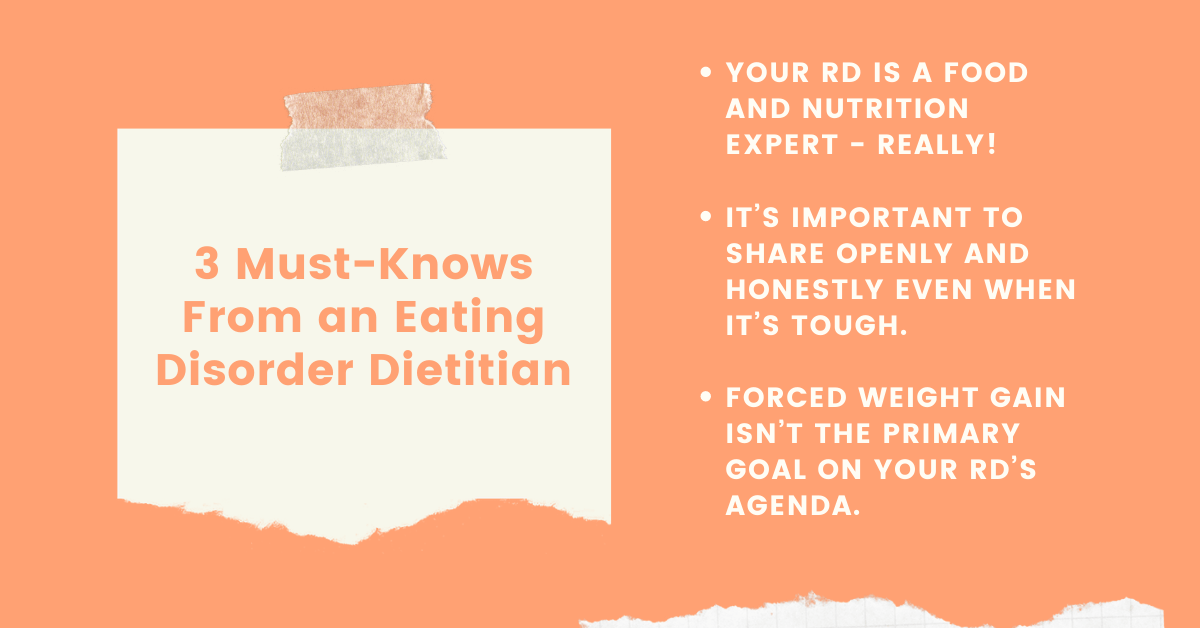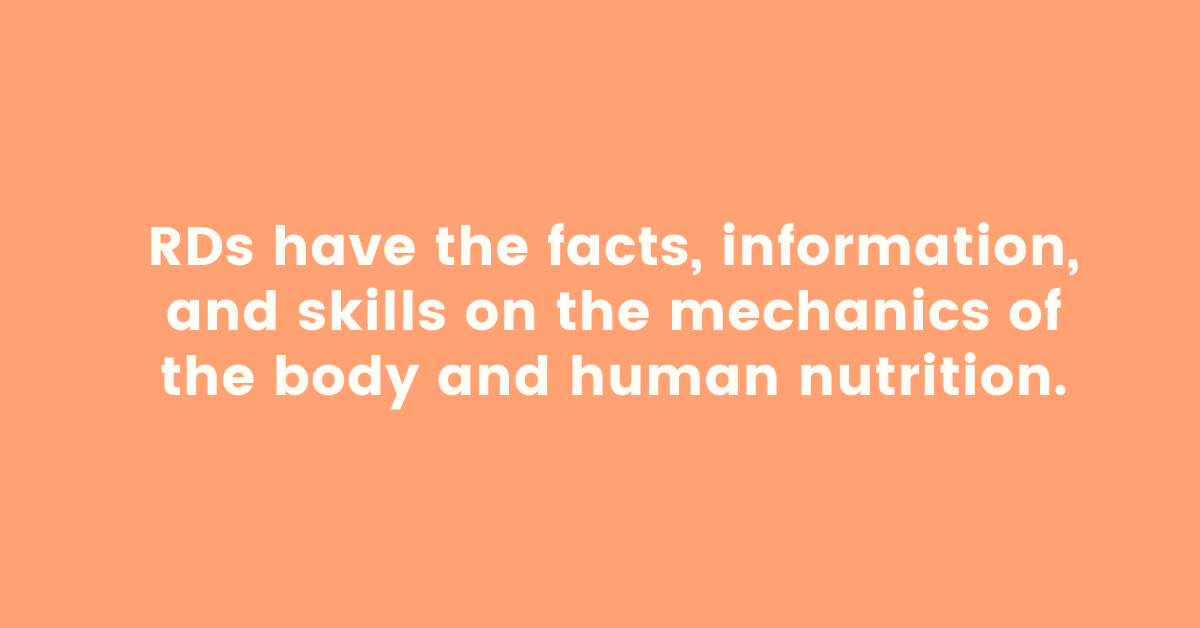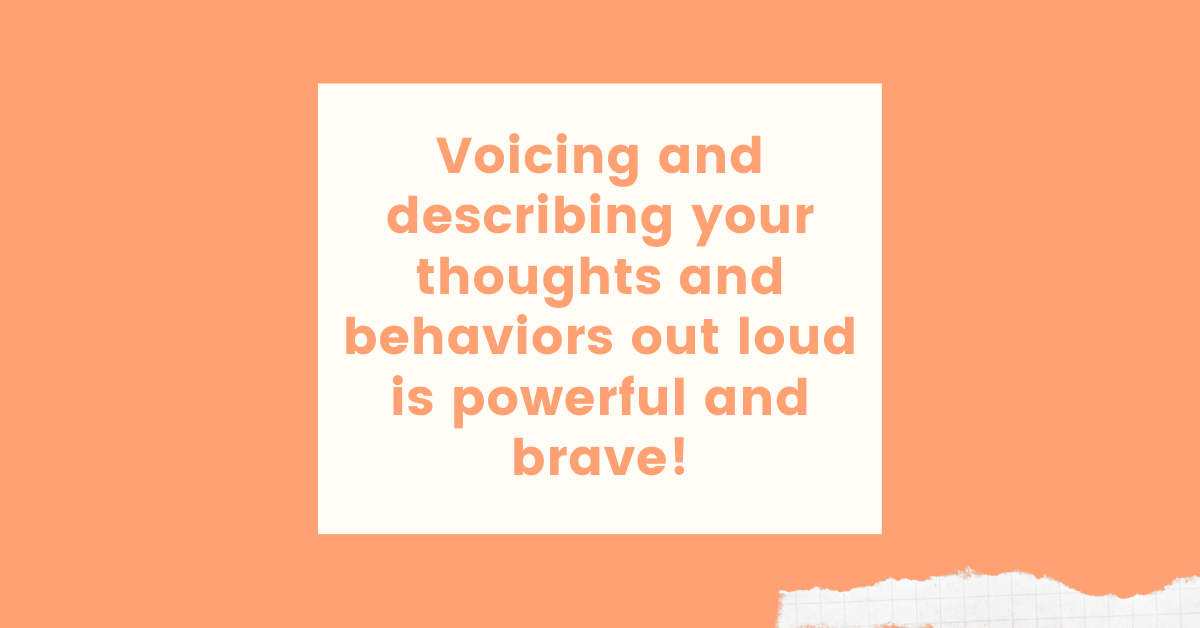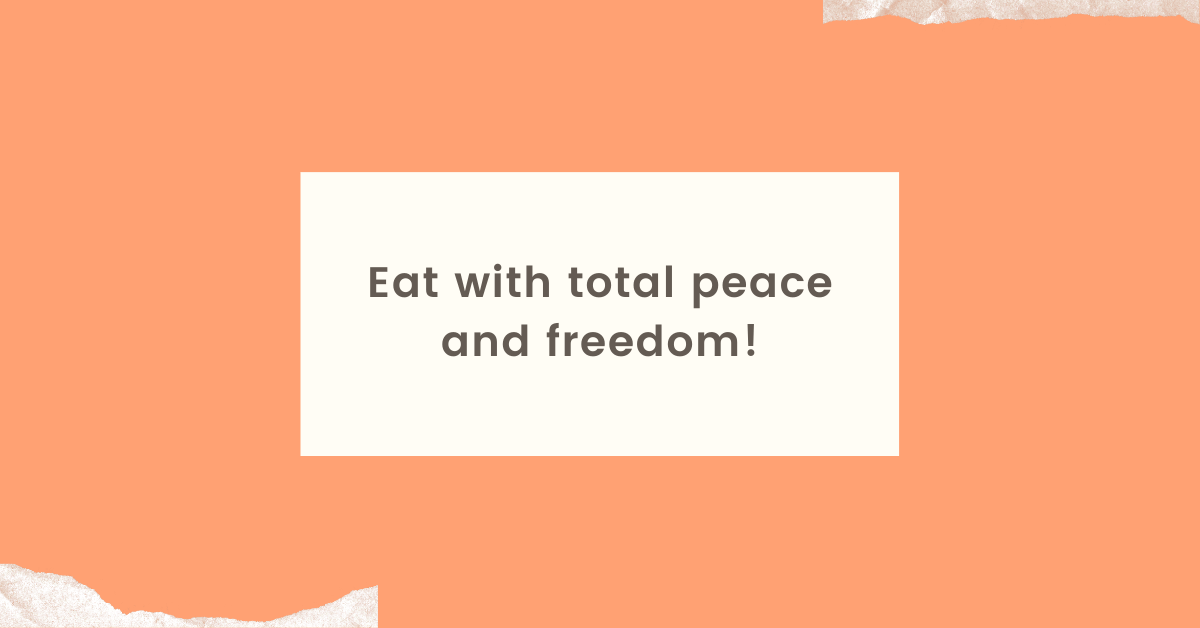3 Must-Knows From an Eating Disorder Dietitian
May 5, 2021
If you’re contemplating seeking help from an eating disorder dietitian or already working with one, odds are that you have a few questions roaming in your mind.
I already know how food works, so why should I listen to a dietitian?
How do I even begin to explain my thoughts and challenges around food?
Does my dietitian just want me to gain weight?
Many people have questions like these, so we thought nothing better than to encourage you with our top 3 must-knows!
Here’s a quick break down of what we want you to know:
- Your RD is a food and nutrition expert – really!
- It’s important to share openly and honestly even when it’s tough.
- Forced weight gain isn’t the primary goal on your RD’s agenda.
Please note that when referring to an eating disorder dietitian, we’re talking about a registered dietitian (RD) specializing in the treatment of eating disorders. Just like you would see a cardiologist for heart treatment, you want to see an RD who’s highly trained in the field of eating disorders.

RDs Are Food and Nutrition Experts
You might assume that RDs just have a passion for food and are knowledgeable about putting nutritious meals together. However, RDs know the ins and outs of nutrition science!
Let’s See What It Takes to Become a Registered Dietitian
- RDs have gone through years of school and extremely thorough training to complete specified academic and supervised practice requirements.
- Biochemistry, anatomy, and physiology are just a few examples of their college coursework. (Talk about a lot of brain work!)
- 1,200 hours of supervised practice experience through an accredited dietetic internship is required, followed by passing a national RD exam.
- RDs continue professional education to keep their knowledge and research current – always learning!
Opinions and advice regarding food cover the internet, but RDs have the facts, information, and skills on the mechanics of the body and human nutrition. They’re the ones you should be listening to, not the “health influencers” on Instagram or that Buzzfeed article about celery juice.
Your RD’s messaging is not the norm and it will feel like everybody else is following trendy new diets such as eating “low carb” or “fat free.” Contrary to what the majority of diets communicate, your RD does want you to spread butter on your bread roll.
This makes it even more difficult to trust their guidance when our society is constantly preaching diet advice, however, it doesn’t discredit your RD. Remember how skilled they are!
Your RD helps you understand how your body works when it comes to food and backs up why the eating disorder is lying to you 99.9% of the time. You may have a rule that “pizza is not allowed, it’s bad” and your RD will teach you exactly why pizza is a great source of carbs, protein, and fat!
In recovery, following the crowd when it comes to dieting is a slippery slope that leads to extreme thinking, which is the main contributor to disordered eating or eating disorders. Dieting is not for you, or anyone. Any form of restriction gets in the way of food freedom!
RDs have all the tools and science to empower you in fighting your eating disorder and reaching full recovery!

Sharing Openly and Honestly Is Key
In your one-on-one sessions or support groups, it’s important to take advantage of that time and talk about your needs. Your RD is not a mind reader and they can only help you the best way possible if you share the thoughts and concerns hiding in your head.
Don’t be afraid to be honest and vulnerable about your behaviors. Shame leads to suffering in silence. Your RD takes you very seriously and recognizes that everything you’re going through is real. You are not alone.
If you’re embarrassed or worried about judgment, please remember, nothing is too minor to share and nothing is too odd or weird to hold back. Voicing and describing your thoughts and behaviors out loud is powerful and brave!
The eating disorder can also twist what’s being discussed or recommended by your RD. Sometimes conversations with your RD get misinterpreted and you feel lost. Planned or unplanned, everyday life outside of your appointments can create even more confusion!
Do any of these internal thoughts sound familiar when you feel stuck in a food battle?
- RD: “Your dinner should include 2 grains.” → You: Oh no, my dinner can ONLY include 2 grains, so I definitely can’t have fries on the side of my burger, right?
- RD: “Try to have your morning snack a couple of hours after breakfast.” → You: I’m hungry, but I can’t eat my snack early, I have to wait until it’s been a few hours.
- RD: “A handful of chips is a normal portion.” → You: A HANDFUL can be so many different sizes, what’s a handful?!
Internal thoughts like these are part of recovery. Keep working on pushing through the unknown when relearning what normal eating looks like!

Forced Weight Gain Is Not the Primary Goal
We live in a society that praises weight loss over weight gain, which makes eating disorder recovery super hard. You might fear facing “too much” weight gain if you choose to walk away from your eating disorder.
Weight gain or weight restoration is not the primary purpose of recovery – there’s so much more that recovery entails! Depending on each unique individual, it can simply be part of the process. Sometimes weight gain is a medical necessity that’s an important aspect of your treatment in order for your recovery to progress.
When weight gain is recommended, the dietitians here know how to approach and manage this at a pace that’s comfortable for you. Challenging your eating disorder is key and your RD will help you move in a positive direction without being too overwhelmed.
Your RD is not out to force your body into a size that it doesn’t want to be. Collaborating with you in a joint effort, to allow your body to return to its biological norm, is the goal.
Everyone has a weight their body settles into comfortably when they’re eating intuitively and nourishing themselves without restriction. Your RD’s job is to help you learn how to listen and respond to your body, so your body can find its preferred weight on its own.
It can be scary when a meal plan or an amount of food is suggested by your RD that you’re not comfortable eating. This doesn’t mean that your RD is writing prescriptions for weight gain. Rather, they’re equipping you with everything you need to eventually eat with total peace and freedom!

As Eating Disorder Dietitians, We “Get It”
When it comes to navigating food struggles, we know how overwhelming recovery can feel. We’re here, rooting for you and ready to help! Reach out and schedule with one of our dietitians today!
Leave a Reply Cancel reply
designed by morgan sinclair designs
privacy policy
//
meet the team
Nutrition counseling
contact
Blog
Monthly Newsletter
Sign up for our
office locations
Phone number
248-686-0340
fax number
248-655-7478
43334 W. 7 Mile Road, Suite 300, Northville, MI 48167
book initial session
8949 Dixie Hwy
Clarkston, MI 48348